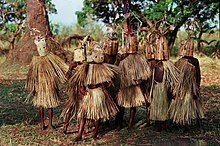Wayao
The Wayao or Yao are an ethnic-linguistic group in the Lake Malawi region , with about one million members in Malawi and a little less than half a million each in northern Mozambique and southern Tanzania . Their language is the Bantu language Yao , also called Chiyao.
history
The Wayao came to present-day Malawi around 1830-1860 and were active as traders between the peoples in the interior and the Arabs and Swahili on the East African coast. They traded in beeswax and ivory and especially slave trade in cooperation with the Swahili, which brought them into conflict with the advancing European colonial powers. Some of the people they sold as slaves were also members of their own people, as the American ethnologist Horatio Hale demonstrated using Yao speakers from the South American city of Rio de Janeiro . Yao slaves also found their way into what is now Somalia , where, along with slaves from other ethnic groups, they became the ancestors of the Somali Bantu .
The Wayao never formed a political unit, but were organized in independent tribal principalities ( chiefdoms ) under economic-military leaders. By 1900 Portuguese, British and German colonizers had brought their territory under their control.
Way of life and culture
The predominant religion of the Wayao is Islam ; the animistic primary religion and Christianity are also widespread.
The Wayao live in villages with about 75 to 100 people who are subordinate to traditional village heads. The office of head is inherited in a matrilineal manner, so that the first-born is usually followed by the oldest sister. After the marriage, the man moves to the woman's village. Every year initiation rituals are carried out, which include the circumcision of the boys. Originally the spirits of the ancestors were worshiped at these ceremonies, today they are associated with Islamic elements.
The basis of life for the Wayao is agriculture, which produces the staple foods maize and sorghum as well as tobacco in Malawi as a cash crop . In areas near lakes and larger rivers, fish supplements the diet.
swell
- Ethnologue.com about the Yao and their language
- Encyclopaedia Britannica: Yao
- Encyclopaedia Britannica: History of Malawi
- ^ Herrmann Jungraithmayr, Wilhelm JG Möhlig (ed.): Lexicon of African Studies. Reimer, Berlin 1983. pp. 101, pp. 270f.
